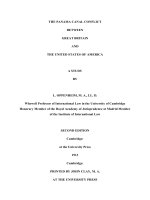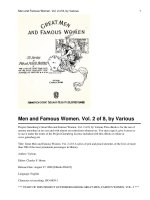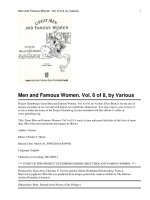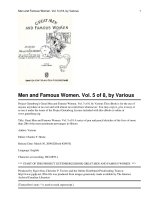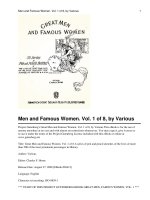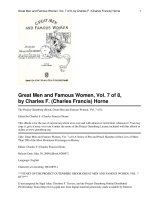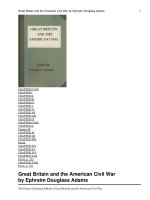- Trang chủ >>
- Cao đẳng - Đại học >>
- Luật
Great Powers and Outlaw States Unequal Sovereigns in the International Legal Order Cambridge Studies in International and Comparative Law
Bạn đang xem bản rút gọn của tài liệu. Xem và tải ngay bản đầy đủ của tài liệu tại đây (3.55 MB, 412 trang )
Great Powers and Outlaw States
The presence of Great Powers and outlaw states is a central but
under-explored feature of international society. In this book, Gerry
Simpson describes the ways in which an international legal order
based on ‘sovereign equality’ has, since the beginning of the
nineteenth century, accommodated the Great Powers and regulated
outlaw states. In doing so, the author offers a fresh understanding of
sovereignty, which he terms juridical sovereignty, to show how
international law has managed the interplay of three languages: the
language of Great Power prerogative, the language of outlawry
(or anti-pluralism) and the language of sovereign equality. The
co-existence and interaction of these three languages is traced through
a number of moments of institutional transformation in the global
order from the Congress of Vienna to the ‘war on terrorism’. The
author offers a way of understanding recent transformations in the
global political order by recalling the lessons of the past, in particular
in relation to the recent conflicts in Kosovo and Afghanistan.
g e r r y s i m p s o n is a Senior Lecturer in the Law Department at the
London School of Economics where he teaches Public International
Law and International Criminal Law. He has been a Legal Adviser to
the Australian Government on international criminal law and was
part of the Australian delegation at the Rome Conference in 1998 to
establish an international criminal court. He has also worked for
several non-governmental organisations and appears regularly in the
media discussing the law of war crimes and the law on the use of
force in international law. Previous publications include The Law of
War Crimes (1997) with Tim McCormack and The Nature of International
Law (2001).
cambridge studies in international and comparative law
Established in 1946, this series produces high quality scholarship in the fields of
public and private international law and comparative law. Although these are distinct legal sub-disciplines, developments since 1946 confirm their interrelation.
Comparative law is increasingly used as a tool in the making of law at national, regional and international levels. Private international law is now often
affected by international conventions, and the issues faced by classical conflicts
rules are frequently dealt with by substantive harmonisation of law under international auspices. Mixed international arbitrations, especially those involving
state economic activity, raise mixed questions of public and private international
law, while in many fields (such as the protection of human rights and democratic
standards, investment guarantees and international criminal law) international
and national systems interact. National constitutional arrangements relating to
‘foreign affairs’, and to the implementation of international norms, are a focus
of attention.
Professor Sir Robert Jennings edited the series from 1981. Following his retirement as General Editor, an editorial board has been created and Cambridge
University Press has recommitted itself to the series, affirming its broad scope.
The Board welcomes works of a theoretical or interdisciplinary character, and
those focusing on new approaches to international or comparative law or conflicts of law. Studies of particular institutions or problems are equally welcome,
as are translations of the best work published in other languages.
General Editors
James Crawford SC FBA
Whewell Professor of International Law, Faculty of Law, and
Director, Lauterpacht Research Centre for International Law,
University of Cambridge
John S. Bell FBA
Professor of Law, Faculty of Law, University of Cambridge
Editorial Board
Professor Hilary Charlesworth Australian National University
Professor Lori Damrosch Columbia University Law School
Professor John Dugard Universiteit Leiden
Professor Mary-Ann Glendon Harvard Law School
Professor Christopher Greenwood London School of Economics
Professor David Johnston University of Edinburgh
Professor Hein Kötz Max-Planck-Institut, Hamburg
Professor Donald McRae University of Ottawa
Professor Onuma Yasuaki University of Tokyo
Professor Reinhard Zimmermann Universit at
¨ Regensburg
Advisory Committee
Professor D. W. Bowett QC
Judge Rosalyn Higgins QC
Professor Sir Robert Jennings QC
Professor J. A. Jolowicz QC
Professor Sir Elihu Lauterpacht CBE QC
Professor Kurt Lipstein
Judge Stephen Schwebel
A list of books in the series can be found at the end of this volume
Great Powers and Outlaw States
Unequal Sovereigns in the International
Legal Order
Gerry Simpson
cambridge university press
Cambridge, New York, Melbourne, Madrid, Cape Town, Singapore, São Paulo
Cambridge University Press
The Edinburgh Building, Cambridge cb2 2ru, UK
Published in the United States of America by Cambridge University Press, New York
www.cambridge.org
Information on this title: www.cambridge.org/9780521827614
© Gerry Simpson 2004
This publication is in copyright. Subject to statutory exception and to the provision of
relevant collective licensing agreements, no reproduction of any part may take place
without the written permission of Cambridge University Press.
First published in print format 2004
isbn-13
isbn-10
978-0-511-21705-0 eBook (NetLibrary)
0-511-21705-6 eBook (NetLibrary)
isbn-13
isbn-10
978-0-521-82761-4 hardback
0-521-82761-2 hardback
isbn-13
isbn-10
978-0-521-53490-1 paperback
0-521-53490-9 paperback
Cambridge University Press has no responsibility for the persistence or accuracy of urls
for external or third-party internet websites referred to in this publication, and does not
guarantee that any content on such websites is, or will remain, accurate or appropriate.
Contents
Foreword
Preface
Acknowledgements
List of abbreviations
Part I
1
Part II
page vii
ix
xvi
xviii
Introduction
Great Powers and outlaw states
3
Concepts
2
Sovereign equalities
25
3
Legalised hierarchies
62
Part III Histories: Great Powers
4
5
6
7
Legalised hegemony: from Congress to Conference
1815--1906
91
‘Extreme equality’: Rupture at the Second Hague
Peace Conference 1907
132
The Great Powers, sovereign equality and the making
of the United Nations Charter: San Francisco 1945
165
Holy Alliances: Verona 1822 and Kosovo 1999
194
Part IV Histories: Outlaw States
8
Unequal sovereigns: 1815--1839
v
227
vi
9
contents
Peace-loving nations: 1945
254
10
Outlaw states: 1999
278
Part V
Conclusion
11
Arguing about Afghanistan: Great Powers and outlaw
states redux
319
The puzzle of sovereignty
352
Select bibliography
Index
354
372
12
Foreword
International lawyers have become used to living with the tension between such formal rules as state equality or state sovereignty (it is rarely
noted that sovereignty is a formal rule), on the one hand, and the pervasive facts of inequality and power differentials among states, on the
other. The usual response is to relegate inequality to the realm of the
political and contingent, and to take comfort in the positive values of formal equality, which after all allows for changes in hierarchies of power
over time: just as everyone is free to dine at the Ritz, so everyone may
aspire to permanent membership of the Security Council, one of international law’s few concessions to formal hierarchy.
Dr Simpson’s approach is different and strikingly original. No formalist, he sees in the interplay between equality and inequality, between
great power and outlaw status, ‘the essence of international law since
at least 1815’. International law is a dialogue of power, and its uneven
application to different states is fundamental, not accidental. The powerful we will always have with us, and even changes in the cast, or caste,
of the powerful will be fewer than we might imagine. And this is not
a contingency: formal equality is a device established by the powerful
in order to underwrite and prolong their power. At the same time they
can engage in the various forms of ostracism -- particularly crude these
days -- which has over time relegated now China, now Vietnam, now
Iraq, now Iran, to the outer reaches.
As a descriptive sociology of the international legal system, Dr
Simpson’s vision is of compelling interest, combining wit, lucidity and
breadth of reference. But he does not put this work forward merely as a
form of descriptive sociology; it is somehow prescriptive -- a vision not
only of an ‘is’ but an ‘ought’, based on the various imperatives of power.
Unless this form of realism is integrated into our understanding of the
vii
viii
foreword
subject we will continue -- Simpson implies -- to be trapped in a sterile
formalism, an international law of small places.
I hope that is not true. It seems to me that the struggle for equality -equality of a kind, even in the very different conditions of the international system -- has a constraining value, and that we should struggle
against the idea that, for example, France may use force where Monaco
or Andorra may not, just as we should struggle against the view that
‘civilisation’ (and ‘Western civilisation’ at that) ever could be, or could
have been, a criterion for legal personality. And yet Dr Simpson’s long
historical account has, among its many values, the special value of the
shaking of a stereotype, of making us think whether our own visions of
the subject can remain the same. It is thoroughly to be recommended.
j a m e s c r aw f o r d
l a u t e r pa c h t r e s e a r c h c e n t r e f o r i n t e r n a t i o n a l l aw
universit y of cambridge
j u n e 2003
Preface
International law had barely escaped its ‘ontological’ phase when it was
ˇiˇzek, declared that the
promptly declared dead.1 The coroner, Slavoj Z
‘war on terrorism’ has delivered the coup de gr ace
ˆ to an international
order based on sovereign equality and capable of constraining power.2
The global political order was now composed of enemies and friends,
not sovereign equals. Others, of a less morbid persuasion, have argued
instead that there is a new constitution afoot. On this view, international law has been not fatally wounded by the events of 2001 but transformed by them. The Great Powers are certainly ‘impatient with the
diplomatic niceties of international law enforcement’ but international
law, ever adaptable and endlessly pragmatic, will accommodate the new
imperatives.3
These arguments are not absurd but they do reflect two common
vanities in discussions of public international law and its role in international affairs: a tendency to accept the terminal impotence of the
discipline and a belief in the novelty of ‘new world orders’ (a collective
obsession since the Twin Towers fell).
In contrast, the image of international legal order presented in this
book is of a system marked, since 1815 by a certain continuity of structure. Juridical sovereignty underpins this structure but this sovereignty
1
2
3
See Thomas Franck, Fairness in International Law and Institutions (1995), 6 (heralding
international law’s post-ontological phase).
ˇiˇzek, ‘Are we in a war? Do we have an enemy?’, London Review of Books 24:10
Slavoj Z
(23 May 2002), 3 (‘the new configuration [post-11 September 2001] entails the end of
international law which, at least from the onset of modernity, regulated relations
between states’).
T. Mills-Allen, ‘US plans anti-terror raids’, Sunday Times, 4 August 2002, 1 (paraphrasing
Washington ‘insiders’). For work along these lines see Michael Glennon, The Limits of
Law, Prerogatives of Power: Interventionism after Kosovo (2001).
ix
x
preface
is protean and flexible and is marked through the interplay of three
languages: the languages of Great Power prerogative, outlawry (or antipluralism) and sovereign equality. In other words, the categories of Great
Powers, friends and enemies (or outlaws), and sovereign equals are each
important to our understanding of the international legal order. In early
2003, as I wrote this preface, the Great Powers were once again preparing
for war with an outlaw state. In the public pronouncements of world
leaders at this time, these three languages and categories co-existed,
sometimes uncomfortably.
The Great Powers, emboldened by the easy projection of authority in
Kosovo and Afghanistan, geared up for a new intervention. In speeches
and official statements, the United States and the United Kingdom governments have spoken of the need to apply power, sometimes in the
absence of explicit UN Security Council authorisation.4 This is often
characterised as ‘unilateralism’ but I want to read this behaviour as part
of a particular tradition of Great Power prerogative and privilege instituted in 1815. It is important that the Great Powers see themselves as
acting in the shadow of international law. But, often, the shadow they
see is their own. They make and remake (but rarely break) international
law. In this tradition, the Great Powers are loath simply to step outside
the law and use brute force. Instead, there has been a practice of willing
into existence new legal regimes in moments of constitutional crisis in
the international system. These new regimes are characterised by the
presence of a phenomenon I want to call legalised hegemony: the realisation through legal forms of Great Power prerogatives. In this book
I describe this tradition, its internal struggles, its external projections
and legitimation through law, and its awkward relationship with law’s
egalitarian face.
At the same time, the public pronouncements of key officials are careful to invoke the international community at every turn. The Great
Powers act not in the name of narrow self-interest but on behalf of
a community of interests or, better still, of humanity itself, credentialising their mission with reference to common values. A necessary adjunct to this rhetorical and legal tradition is the presence of states and
groups operating outside the universal community, acting in the cause
4
E.g. Julian Borger, ‘Straw threat to bypass UN over attack on Iraq’, The Guardian,
19 October 2002, 1 (quoting UK Foreign Secretary Jack Straw stating: ‘We are
completely committed to the United Nations route, if that is successful. If, for example,
we end up being vetoed . . . then of course we are in a different situation’).
preface
xi
of inhumanity.5 Wars are fought not between adversaries but between
the international community and international renegades or between
the universal and the particular, e.g. ‘human rights’ and ‘Islamic terrorism’. This language has become more transparent in recent years. The
word ‘Manichean’ has become a cliché of political commentary as observers struggle to come to terms with this idea. The central figure in
all this is the outlaw state: a figure whose estrangement from the community of nations and demonisation by that community has long been
required as part of the project of creating and enforcing international
‘society’.
International law is important in the constitution and regulation of
outlaw states. These states are mad, bad or dangerous, or all three. Some
are incapable of forming the correct attitude towards the international
legal order. They lack ‘a reciprocating will’ (mad). Some are serial violators of the dominant mores of the international legal order (bad).
Others are a threat to the international legal order because of some internal malfunction or propensity to disorder (dangerous). In each case,
law supervises the relationship between the community and the outlaw. James Lorimer wrote in 1888 of the need to respond to terror with
‘the terrors of the law’. These ‘terrors’ have been regularly applied to
those outside the ‘family of nations’. As I indicate in this book, outlaw
states are outside the law in one sense but thoroughly entwined in its
terrors in another. This dual aspect to the position of outlaw states will
be emphasised in some of the later chapters where a link will be drawn
between the nineteenth-century practices of demarcation and the contemporary manifestations of it in the designation of states as ‘criminal’
or ‘rogue’. Sometimes this connection is made explicit. Philip Henscher,
writing in The Independent in early 2001, adopted nineteenth-century language in discussing the then-incumbent Taliban regime in Afghanistan
when he remarked: ‘Of course, the horrors perpetrated by the regime
place it beyond the pale of any standard of civilisation.’6 In 2002, the US
National Security Council celebrated the fact that (in Afghanistan) ‘our
enemies have seen the results of what civilized nations can, and will,
do against regimes that harbor, support, and use terrorism’.7
5
6
7
Carl Schmitt, The Concept of the Political, trans. and ed. George Schwab, 54.
Philip Henscher, ‘We should still talk to the Taliban’, The Independent, Monday Review,
5 March 2001, 5.
US National Security Strategy, September 2002 at />
xii
preface
I describe this tendency as anti-pluralism: the practice of making legal distinctions between states on the basis of external behaviour or
internal characteristics.8 This book is also, then, about outlaw states in
the international legal order. It describes their encasement in the legal
order and separation from it, their role as threat and necessity and the
relationship between the idea of outlawry and law’s pluralist face.
Finally, international law is also a language of equality. Indeed, one of
the most pervasive images of international legal order posits a community of equals engaging in relations through juridical forms. Equality is
regarded as integral to sovereignty. In a lecture on the future of international law, in 1920, Lassa Oppenheim called the equality of states ‘the
indispensable foundation of international society’.9 More recently Bruno
Simma has asserted that ‘all states in the world possess suprema potestas and are thus not placed in any kind of hierarchy, international law
must proceed from the basis of equal sovereignty of states’.10 This principle is usually described as sovereign equality. To what extent, though, are
these articulations of sovereign equality accurate characterisations of
the sovereignty order? The idea of sovereign equality does much work
in international law but, for my purposes, it has two primary roles.
First, it parlays into a commitment to a pluralist international legal
order (bluntly, one in which state diversity is tolerated). Or as Vattel
put it: ‘Nations treat with one another as bodies of men and not as
Christians or Mohammedans.’11 Second, the principle of sovereign equality conveys the idea of an egalitarian international legal order (one in
which states are legally equal). There is a tension between the pluralist,
egalitarian aspect and the anti-pluralist, hierarchical (or hegemonic) aspect. This interaction establishes the conditions for what I call juridical
sovereignty.
In this book, then, I offer a fresh understanding of sovereignty
grounded in a complex of norms and ideas in which the competing
claims of legalised hegemony, anti-pluralism and sovereign equality are
arranged and ordered. In doing so, I tell a story about the Great Powers,
8
9
10
11
In a later discussion of the war on Afghanistan and the treatment of the detained
prisoners on Guantanamo Bay, I discuss also the way in which the position of outlaw
personnel, i.e. Taliban and al-Qa’ida prisoners under US control, reflects the position
of the outlaw state in international law: in a lawless space but subject to intense
scrutiny and surveillance. See below at pp 343--6.
L. Oppenheim, The Future of International Law, Carnegie Endowment for International
Peace, Pamphlet No. 39 (1920), 20.
B. Simma, ed., The Charter of the United Nations: A Commentary (1994), 87.
Vattel, The Law of Nations, ed. J. Chitty (1863), 195.
preface
xiii
outlaw states and sovereign equality in the context of the post-1815 international legal order.
······ · ···
What is at stake in all this? Every author must face his or her own
moments of crisis. Why write? Why write this? I suspect there are intellectual and political imperatives (perhaps, even literary values) at work
here, as well as serendipity. Intellectually, I wanted to explain a mystery or explore an intuition I had about the international legal order.
It seemed to me that the presence of Great Powers and outlaw states
was a central but under-explored feature of international society. This,
alone, made the project at least plausible. In particular, I have always
been frustrated at the mismatch between law’s universalist pretensions
and its partialities and discriminations. But more than this, the endless
debates about humanitarian intervention or anticipatory self-defence or
sovereign immunity seemed irresolvable, or at least unfruitful, without
a consideration of identity. Much as we disparaged primitive realists
for their billiard ball projections in which states were undifferentiated,
our commitment to statism was just as remarkable. States were juridically equivalent on the orthodox view and any analysis of, say, sovereign
immunity or humanitarian intervention had to proceed from this assumption. And yet, these doctrines seemed to be shaped by the specific
identity of the protagonists as much as by a claim to universal application. Immunity was disposable in cases involving outlaws but tenaciously
applied to the personnel of the Great Powers themselves. Self-defence expanded to meet the requirements of these powers but was suddenly subject to contraction when outlaws such as Vietnam, in 1979, attempted
to justify their actions under the doctrine. This was, it seemed to me,
not just international law perverted or applied unfairly. This was the
essence of international law since at least 1815. The way international
law worked, at least some of the time, was dependent on the identity of
the protagonists involved.
At a very basic level, the book also has something to say about some of
the most controversial matters in international law and politics. To what
extent ought the international community be composed of like-minded
states? Is there an advantage to be gained by restricting state diversity
in pursuit of the democratic peace? Ought our treatment of ‘uncivilised’
states in the nineteenth century give us pause when we use the language
of democracy, civilisation and decency today? Should international legal
rules operate equally as between the Great Powers and the other states
or is it unrealistic to expect Russia or the United States or France to be
xiv
preface
bound by the same restrictions on, say, the use of force as the rest of
the international community?
In all this there is the inevitable allure of studying high politics
(the Great Powers) and international deviance (outlaw states), each set
against the apparent innocence of an international legal order based on
sovereign equality. Politically, this book was written as a way of reinterpreting international law’s past by rejecting its bogus doctrinal innocence without collapsing it into mere politics. I wanted to understand
the Great Powers and outlaw states as legal concepts, as relevant to legality as sovereign equality. The idea was to make a stand for relative autonomy without thereby suggesting that law was emancipation or progress
to the brutish materialism of politics or international relations.
More specifically, the writing of this book was motivated by three experiences. First, I had long been drawn to international law theory. The
people who interested me were described (though rarely self-described)
as ‘theorists’ and their work simplified complex doctrine and complicated apparently simple propositions about the world. In my own work,
I decided to begin tracing the development of an idea across time and
study how theories participated in or modified this development. I was
interested in the effects of, for example, ‘liberalism’ on the way people
imagined what they were doing.
Second, I had been doing work on ‘sovereignty’ in international law,
e.g. why indigenous peoples did not possess it and how ethnic groups
got it. This work seemed unsatisfactory so I shifted from thinking of
sovereignty as a given (the problem then being who should acquire it)
to conceptualising it as a problem. Here, I became interested in the
changes in the form of sovereignty wrought by the adoption of certain
legal techniques, e.g. the grading of sovereignty in international organisations and the distinction in theory and practice between good and
bad sovereigns.
Third, I had attended two international diplomatic conferences and
sat in on various UN and governmental meetings on international criminal law. Here, I had noticed an increasing tendency to distinguish between members of the international community in good standing and
dissident states or outlaws, and a long-standing requirement that special
privileges be secured for powerful states. As a consequence, at these conferences sovereign equality was quickly displaced by all sorts of hierarchies. Sovereign equality operated in the plenaries but there were small
groups of powerful states in meetings euphemistically called ‘informal
informals’, good citizen middle-ranking states in ‘like-minded groups’
preface
xv
and representatives from ‘outlaw’ states like Iran and Iraq exiled in coffee shops, ruminating under puffs of smoke. I became interested in explaining or understanding these hierarchies as part of a larger system
of equality and hierarchy.
This book then combines these interests. It is a book about sovereignty
(but understood in broader terms than my work on self-determination
had permitted and in narrower terms than those used by many political
scientists), a book that would satisfy my theoretical inclinations (understood here as an interest in the development of ideas across time) and a
book that would help explain the puzzle of international law and organisations (being hierarchical and egalitarian, pluralist and anti-pluralist
at the same time).
······ · ···
Acknowledgements
This book is the product, and I hope a reflection, of a lengthy period of
study. I would like to thank José Alvarez for his encouragement at the
beginning of this process, his forthright criticism and urgings throughout the writing of the thesis and forbearance at its conclusion. The
other members of my doctoral committee, Brian Simpson and James
Hathaway, each read drafts of several chapters and offered generous
(in both senses of that word) written comments on them. They each
prompted me to rethink the substance and presentation of the thesis.
Virginia Gordan has provided helpful advice throughout and I benefited
greatly from courses taught by Don Regan, Thomas Green, Joseph Raz
and José Alvarez in Ann Arbor, John Rankin at Aberdeen, Maurice
Copithorne at the University of British Columbia and David Kennedy at
Harvard as well as from conversations in Ann Arbor with Vladimir Djeric,
Gunnar O’Neill and Christian Tietje.
The University of Melbourne and the Australian National University
each supported me during sabbaticals in 1995 and 1999 (during which
some parts of the thesis were written). I would like to thank the Dean at
Melbourne, Michael Crommelin and the two Deans who supported me in
Canberra, Tom Campbell and Michael Coper. My sabbatical in 1999 was
spent at Harvard Law School where I was a Visiting Scholar. The London
School of Economics has proved a congenial home for me since I joined
the Faculty there in 2000 and I completed this book while working at
that institution. The thesis was presented in some form or other to responsive audiences in Helsinki, Glasgow, Boston, Edinburgh, Washington
DC and Melbourne. Catriona Drew and Susan Marks tolerated, with good
grace, my views on the subject of outlaws. Expert research assistance
was provided by Ruth Tomlinson, Sonya Sceats, Gus Van-Harten, Jennifer
Welch, Neville Sorab and Hannah Ashton-Suissa. I would like to thank,
xvi
acknowledgements
xvii
too, Finola O’Sullivan, Jackie Warren and Sara Adhikari at Cambridge
University Press for their diligent work on this book. I have been blessed
with an unusually lively and intimate group of international law colleagues over the years. In Melbourne: Kris Walker, Pene Mathew, Hilary
Charlesworth, Ian Malkin, Di Otto and Tim McCormack. In Canberra:
Don Greig, Robert McCorquodale, J. P. Fonteyne, Martin Phillipson and
Anne Orford. In London: Chaloka Beyani, Christine Chinkin, Chris Greenwood, Declan Roche, Max du Plessis and Fabricio Guariglia.
Catriona Drew, Nick Wheeler and Deborah Cass each read a number
of chapters and made telling contributions to the development of the
ideas in the book.
Two parts of this book have been published previously. Chapter 6, ‘The
Great Powers, Sovereign Equality and the Making of the UN Charter’
appeared in a Festschrift for Don Greig in the Australian Yearbook of International Law and an early version of Chapter 9 appeared under the title,
‘Two Liberalisms’ in the European Journal of International Law.
I am unable to offer one of those unconvincing apologies for time
spent away from children since my daughters frequently interrupted the
writing of the book. But perhaps Hannah and Rosa should be thanked.
Because, as my Grandmother would have said, when they were born,
they brought their love with them, and because, but for them, the book
would be much longer.
This book is for Deborah.
Abbreviations
AJIL
ASIL
BFSP
BYIL
CWILJ
DO
EC
EJIL
EJIR
EU
FRY
GA
GATT
ICLQ
ICJ
ICJ Rep.
American Journal of International Law
American Society of International Law
British and Foreign State Papers
British Yearbook of International Law
California Western International Law Journal
Dumbarton Oaks
European Community
European Journal of International Law
European Journal of International Relations
European Union
Federal Republic of Yugoslavia
(United Nations) General Assembly
General Agreement on Tariffs and Trade
International and Comparative Law Quarterly
International Court of Justice
International Court of Justice, Reports of Judgments, Advisory
Opinions and Orders
International Criminal Tribunal for the Former Yugoslavia
International Law Commission
International Legal Materials
International Law Reports
International Monetary Fund
International Organisation
International Relations
International Security Assistance Force
King’s Bench
Kosovo Force
League of Nations Treaty Series
ICTY
ILC
ILM
ILR
IMF
IO
IR
ISAF
KB
KFOR
LNTS
xviii
list of abbreviations
Nato
NIEO
NILR
NLR
NYUJILP
OECD
OPEC
OSCE
PCAJ
PCIJ
RDILC
Res.
RIAA
SC
SCOR
UKMIL
UN
UNCIO
UNGAOR
UNITAR
UNTAET
UNTS
VCLT
WTO
YLJ
xix
North Atlantic Treaty Organisation
New International Economic Order
Netherlands International Law Review
National Law Review
New York University Journal of International Law and Policy
Organisation for Economic Cooperation and Development
Organisation of the Petroleum Exporting Countries
Organisation for Security and Cooperation in Europe
Permanent Court of Arbitral Justice
Permanent Court of International Justice
Revue de droit international et de législation comparée
Resolution
Reports of International Arbitral Awards
Security Council
Security Council Official Records
United Kingdom Materials in International Law
United Nations
United Nations Conference on International Organisation
United Nations General Assembly Official Records
United Nations Institute for Training and Research
United Nations Transitional Administration in East Timor
United Nations Treaty Series
Vienna Convention on the Law of Treaties
World Trade Organisation
Yale Law Journal
Part I Introduction
1
Great Powers and outlaw states
The history of the international system is a history of inequality par
excellence.1 [T]he sovereignty and equality of states represent the basic
constitutional doctrine of the law of nations.2
In 1602, Spain and The Netherlands were embroiled in a long running
war in Europe and this conflict carried over into hostilities between
Dutch trading companies and Portuguese and Spanish maritime interests in East Asia. During one of many engagements on the high seas, an
affiliate of the Dutch East Indies Company had captured a Portuguese
vessel named ‘The Catherine’.3 On 9 September 1604, a Prize Court in
Amsterdam declared the capture lawful and held that the vessel belonged to the Dutch company.4 The matter probably would have rested
there were it not for the fact that among the company shareholders
were members of a Mennonite sect who disapproved of war, refused to
accept their share of the profits and threatened to establish a competing
company in France.5
In the same year, Hugo Grotius was about to turn twenty-one. He took
a keen interest in the Catherine case and spent the remainder of the
year composing his first major work, De jure praedae (Commentary on the
Law of Prize and Booty), a defence of the Dutch seizure and a sketch of
a theory of international law to be fully realised in his classic De jure
1
2
3
4
5
R. Tucker, The Inequality of States, 8.
I. Brownlie, Principles of Public International Law, 5th edn, 289.
See Martin Wight, ‘Western Values in the International System’ in H. Butterfield and
M. Wight (eds.), Diplomatic Investigations: Essays in the Theory of International Politics, 104--5.
See H. Grotius, De jure praedae commentarius (1605), The Classics of International Law (ed.
J. B. Scott), Preface, xiii. The transcript of the proceedings was destroyed by fire shortly
after the hearing.
Ibid., xiii, 1, 4--5 and 283--317.
3
4
g r e a t p o w e r s a n d o u t l aw s t a t e s
belli et pacis (The Law of War and Peace). De jure praedae begins with the
words:
A situation has arisen that is truly novel and scarcely credible . . . namely: that
those men who have been so long at war with the Spaniards . . . are debating
as to whether or not, in a just war and with public authorisation, they can
rightfully despoil an exceedingly cruel enemy . . .6
This may not be the opening sentence in the literature of international law but it baptises the classical Grotian period.7 De jure praedae,
then, inaugurates a particular tradition in international law and does
so by characterising certain states as beyond the pale. But De jure praedae
began the Grotian period in an incongruous manner. This conception
of international law that draws legal distinctions among states on the
basis of their internal politics or moral characteristics did not become
the dominant tradition in the Grotian period following the Peace of
Westphalia.
One of the arguments pursued in this book is that the Grotian sensibility seen in the first paragraphs of De jure praedae (I describe it as antipluralism) remained in abeyance until the nineteenth century when it
again became an explicit part of the international legal structure with
the introduction of a distinction between civilised and uncivilised states.
This distinction was in turn reflected in the idea that there was a ‘Family
of Nations’ embedded in a wider system of states. Indeed, it was another
Grotian principle, that of sovereign equality (or at least that element of
it I call existential equality), that informed the practice of states until
the nineteenth century, was revived by the UN Charter commitment to
state equality in the middle of the twentieth century and has remained
influential among writers and scholars throughout the periods under
discussion.
The De jure praedae conception of international law that distinguishes
the ‘exceedingly cruel’, uncivilised or outlaw state from the civilised or
democratic state has waxed and waned throughout the modern history
of international law. At various times, Turkey, China, Bolshevik Russia
and Weimar Germany have been assigned bandit or uncivilised status.
With the abolition of the standard of civilisation and the rise of the
6
7
Ibid., 1.
Martin Wight saw this opening paragraph as a description of ‘a dramatic
confrontation between the state that is law-abiding and the delinquent state (it is also
a confrontation between the state with constitutional processes and the despotic
state)’. See Wight, ‘Western Values’, 104.

